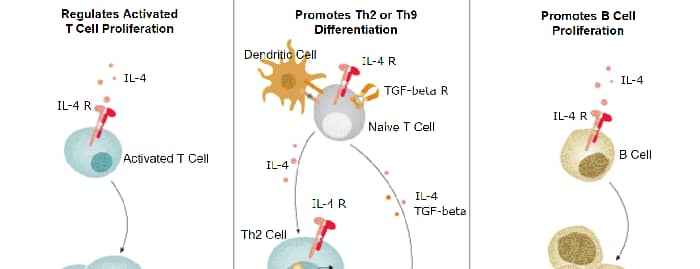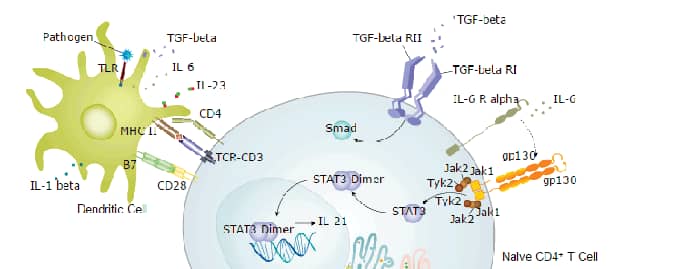TGF-beta 1 Antibody Summary
Applications
under non-reducing conditions only
Please Note: Optimal dilutions should be determined by each laboratory for each application. General Protocols are available in the Technical Information section on our website.
Preparation and Storage
- 12 months from date of receipt, -20 to -70 °C as supplied.
- 1 month, 2 to 8 °C under sterile conditions after reconstitution.
- 6 months, -20 to -70 °C under sterile conditions after reconstitution.
Background: TGF-beta 1
Transforming Growth Factor Beta 1, 2, and 3 (TGF-beta 1, TGF-beta 2, and TGF-beta 3) are highly pleiotropic cytokines that virtually all cell types secrete. TGF-beta molecules are proposed to act as cellular switches that regulate processes such as immune function, proliferation, and epithelial-mesenchymal transition. Targeted deletions of these genes in mice show that each TGF-beta isoform has some non-redundant functions: TGF-beta 1 is involved in hematopoiesis and endothelial differentiation; TGF-beta 2 affects development of cardiac, lung, craniofacial, limb, eye, ear, and urogenital systems; and TGF-beta 3 influences palatogenesis and pulmonary development. The full range of in vitro biological activities of TGF-beta 5 has not yet been explored. However, TGF-beta 1, TGF-beta 2, TGF-beta 3, and TGF-beta 5 have been found to be largely interchangeable in an inhibitory bioassay, and it is anticipated that TGF-beta 5 will show a spectrum of activities similar to the other TGF-beta family members. To date, the production of TGF-beta 5 has only been demonstrated in Xenopus.
TGF-beta ligands are initially synthesized as precursor proteins that undergo proteolytic cleavage. The mature segments form active ligand dimers via a disulfide-rich core consisting of the characteristic 'cysteine knot'. TGF-beta signaling begins with binding to a complex of the accessory receptor betaglycan (also known as TGF-beta RIII) and a type II serine/threonine kinase receptor termed TGF-beta RII. This receptor then phosphorylates and activates a type I serine/threonine kinase receptor, either ALK-1 or TGF-beta RI (also called ALK-5). The activated type I receptor phosphorylates and activates Smad proteins that regulate transcription. Use of other signaling pathways that are Smad-independent allows for distinct actions observed in response to TGF-beta in different contexts.
Product Datasheets
Citations for TGF-beta 1 Antibody
R&D Systems personnel manually curate a database that contains references using R&D Systems products. The data collected includes not only links to publications in PubMed, but also provides information about sample types, species, and experimental conditions.
11
Citations: Showing 1 - 10
Filter your results:
Filter by:
-
BMP4 inhibits PDGF-induced proliferation and collagen synthesis via PKA-mediated inhibition of calpain-2 in pulmonary artery smooth muscle cells.
Authors: Cai P, Kovacs L, Dong S et al.
Am. J. Physiol. Lung Cell Mol. Physiol.
-
Suppression of AKT Phosphorylation Restores Rapamycin-Based Synthetic Lethality in SMAD4-Defective Pancreatic Cancer Cells
Authors: Onica Le Le Gendre, Ayisha Sookdeo, Stephie-Anne Duliepre, Matthew Utter, Maria Frias, David A. Foster
Molecular Cancer Research
-
DCN released from ferroptotic cells ignites AGER-dependent immune responses
Authors: J Liu, S Zhu, L Zeng, J Li, DJ Klionsky, G Kroemer, J Jiang, D Tang, R Kang
Autophagy, 2021-12-29;0(0):1-14.
Species: Human
Sample Types: Cell Lysates
Applications: Western Blot -
Transforming growth factor beta induces sensory neuronal hyperexcitability, and contributes to pancreatic pain and hyperalgesia in rats with chronic pancreatitis.
Authors: Zhu Y, Colak T, Shenoy M, Liu L, Mehta K, Pai R, Zou B, Xie X, Pasricha P
Mol Pain, 2012-09-11;8(0):65.
Species: Rat
Sample Types: In Vivo
Applications: Neutralization Control -
Activin A is an anticatabolic autocrine cytokine in articular cartilage whose production is controlled by fibroblast growth factor 2 and NF-kappaB.
Authors: Alexander S, Watt F, Sawaji Y, Hermansson M, Saklatvala J
Arthritis Rheum., 2007-11-01;56(11):3715-25.
Species: Human, Porcine
Sample Types: Whole Cells
Applications: Neutralization -
Human dendritic cells acquire a semimature phenotype and lymph node homing potential through interaction with CD4+CD25+ regulatory T cells.
Authors: Bayry J, Triebel F, Kaveri SV, Tough DF
J. Immunol., 2007-04-01;178(7):4184-93.
Species: Human
Sample Types: Whole Cells
Applications: Neutralization -
Foxp3+CD4+CD25+ T cells control virus-specific memory T cells in chimpanzees that recovered from hepatitis C.
Authors: Manigold T, Shin EC, Mizukoshi E, Mihalik K, Murthy KK, Rice CM, Piccirillo CA, Rehermann B
Blood, 2006-02-14;107(11):4424-32.
Species: Primate - Pan troglodytes (Chimpanzee)
Sample Types: Whole Cells
Applications: Neutralization -
Nonlymphoid peritoneal cells suppress the T cell response to Mls.
Authors: Rosini L, Matlack R, Taylor J, Howell KF, Yeh K, Pennello A, Riggs JE
Immunobiology, 2004-01-01;209(8):575-84.
Species: Mouse
Sample Types: Whole Cells
Applications: Neutralization -
New methodologies to accurately assess circulating active transforming growth factor-beta 1 levels: implications for evaluating heart failure and the impact of left ventricular assist devices
Authors: Donna Mancini, Juan Monteagudo, Mayte Suárez-Fariñas, Jeffrey Bander, Rohan Varshney, Juana Gonzalez et al.
Translational Research
-
HIV protease inhibitor-induced cardiac dysfunction and fibrosis is mediated by platelet-derived TGF-?1 and can be suppressed by exogenous carbon monoxide
Authors: J Laurence, S Elhadad, T Robison, H Terry, R Varshney, S Woolington, S Ghafoory, ME Choi, J Ahamed
PLoS ONE, 2017-10-31;12(10):e0187185.
-
Praliciguat inhibits progression of diabetic nephropathy in ZSF1 rats and suppresses inflammation and apoptosis in human renal proximal tubular cells
Authors: Guang Liu, Courtney M. Shea, Juli E. Jones, Gavrielle M. Price, William Warren, Elisabeth Lonie et al.
American Journal of Physiology-Renal Physiology
FAQs
No product specific FAQs exist for this product, however you may
View all Antibody FAQsReviews for TGF-beta 1 Antibody
There are currently no reviews for this product. Be the first to review TGF-beta 1 Antibody and earn rewards!
Have you used TGF-beta 1 Antibody?
Submit a review and receive an Amazon gift card.
$25/€18/£15/$25CAN/¥75 Yuan/¥2500 Yen for a review with an image
$10/€7/£6/$10 CAD/¥70 Yuan/¥1110 Yen for a review without an image









